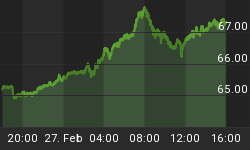After a decade-long bull run, Morgan Stanley now says it’s seeing signals that it might be time to ditch the growth stocks and hit up value again, with interest rate hikes potentially paving the way for end-of-cycle risks.
It’s what Morgan Stanley calls a “tipping point” that “lays the groundwork for something of a regime change that is very much in line without overall outlook for the S&P 500”.
Those are the words of equity strategist Mike Wilson, who’s said before that the bull-run is already over and the time of the bear has begun, with a correction coming as soon as 2019.
Surging bond yields are the “tipping point”, and the “regime change” could lead to a shift in allocations in the U.S. from growth stocks to value stocks. And when they do, some of those investor darlings could be hit hard.
That means tech stocks, too, such as Facebook, Amazon, Netflix and Alphabet.
Instead, Morgan Stanley is favoring energy, utilities and financials.
We may not have seen yields hit their peak spike yet, but last week’s surge has led to a broad sell-off across global markets, and the Fed seems bent on interest rate hikes still. It will also bring about a “capping” of equity market valuations and bring end-of-cycle risks into focus, says Wilson.
In other words, as yields climb further, economic growth will slow and future earnings of our favorite growth sticks will be under significant pressure.
Mid-term elections are also at play here.
It’s quite possible that the most recent yield surge had something to do with the turn-around in mid-term election outcome expectations as it now looks more possible that the Republicans will sweep Congress, while the markets until now had been expecting a Democrat victory. Related: “Rising Inequality” Could Impact America’s AAA Credit Rating
"If the market begins to believe that a Republican sweep is likely to occur in the midterms, the likelihood of a tax cut extension, infrastructure spending and continued focus on trade protectionism all rise. We view these potential policy paths as inflationary and likely to add to the deficit, providing upward pressure on rates," Wilson wrote.
But this time around, he noted, a Republican win isn’t going to mean a growth spurt. This isn’t 2016, and there aren’t big tax cuts to be unleashed, or big fiscal spending announcements.
The bottom line is that value looks set to re-emerge as dominate over growth stocks.
High-flying growth stocks get a high valuation in terms of the price investors are asked to pay for things like book value or asset value after subtracting net debt. They’re focused on the future—not the present, and their usually riskier.
Related; Ford Continues To Struggle As Trade War Escalates
Value stocks, by comparison, usually trade a lower prices relative to their fundamentals, and while they’ve pretty much been the unwanted stepchild in the bull market of the past decade, and have significantly underperformed, the “regime change” Morgan Stanley is calling signals a return of their attractiveness.
Typically, the shift from growth to value stocks happens with a fair amount of cacophony at the end of a big business cycle. After the 2008 financial crisis, high-flying growth stocks outperformed because the future was all investors had to look forward to. But even so, the massive favoring of growth stocks really soared in 2017, coinciding with the tech explosion, including the Internet of Things (IoT) and e-commerce.
But everything’s part of a “cycle”, and from Wilson’s point of view, this is the end.
By Tom Kool for Safehaven.com
More Top Reads From Safehaven.com:
















